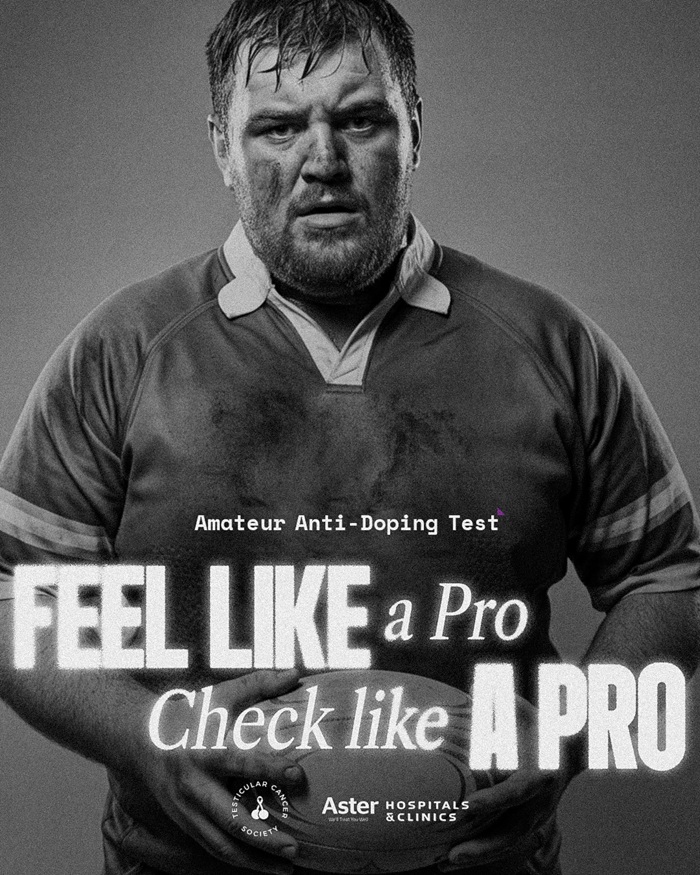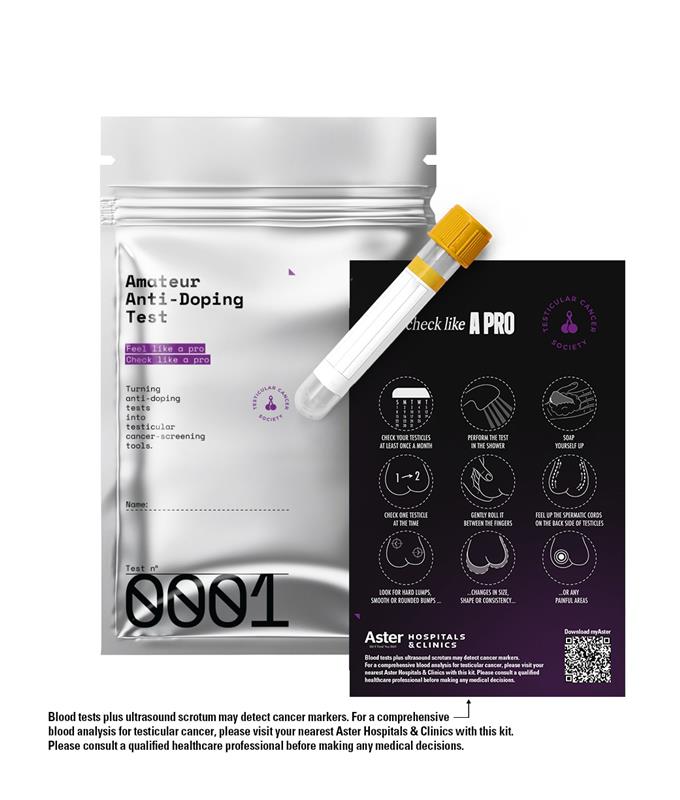Bringing Early Detection to the Field
- Testicular cancer is the most common cancer among men aged 15 to 44 in 62 countries worldwide, yet nearly 46% of men do not perform self-examinations.
- Approximately 600 deaths from testicular cancer are projected in the US for 2025.
- The initiative aims to encourage regular self-examination, turning it into a live-saving routine habit among men
Dubai, April 9th 2025: The Testicular Cancer Society in partnership with Aster Hospitals & Clinics, and in collaboration with creative agency – FP7McCann, have launched a one-of-a-kind initiative with positive disruption on fields for amateur sportsmen.

Introducing the Amateur Anti-Doping Test Kit, a tool designed to repurpose routine anti-doping screenings for early testicular cancer detection, promoting awareness and encouraging self-examinations. Launched across regional and global markets, including the UAE, US, and UK, the creative approach stems from a compelling insight: some pro athletes who tested positive during routine doping screenings were later diagnosed with testicular cancer.

This connection underscored a missed opportunity, turning anti-doping tests into an entry point for proactive health checks. But pros are only 1% of athletes. What about the other 99%? The amateur athletes.
Testicular cancer remains the most common cancer among men aged 15 to 44 in 62 countries worldwide (National Library of Medicine), yet awareness remains low. Studies indicate that 46% of men do not perform self-examinations (Cancer Treatment Centers of America), despite the fact that 99% of cases are treatable when caught early. The Amateur Anti-Doping Test aims to change this by meeting men where they already are, on the field, in the gym, and at their weekend games.
The campaign also emphasizes what experts have long identified as the first and most crucial line of defense: self-examination. Early detection begins with knowing how to check for warning signs, yet 73% of men reported not performing testicular self-examinations (TSE) due to lack of knowledge (APJCC).
A Simple, Accessible Solution
The Amateur Doping Test Kit comes in, as an additional layer of awareness and detection, providing amateur athletes with an accessible, straightforward guide to both self-check and advanced testing.
The kit includes:
- A step-by-step manual on how to perform a testicular self-exam
- Certified blood test tube for sample collection that can be availed at Aster Hospitals & Clinics and can help in detecting in testicular cancer markers
How Does it Work?
- Registration: Amateur sports group representatives sign up on amateurantidopingtest.com to have their athletes participate in the Amateur Anti-Doping program. The kits are funded voluntarily by the amateur athletes themselves through their league registration fees.
- Distribution: Upon approval, amateur sports group representatives receive the kits and distribute them to the athletes who have volunteered to participate in the program.
- Sample Collection: Participating athletes can take the sample kit to any Aster Hospitals & Clinics location and provide their blood sample for analysis.
- While Awaiting Results: Amateur athletes should use this time to review and master the testicular self-exam guide included with their kit.
- Follow-Up Care: If blood test results are positive for testicular cancer markers, or if anything unusual is noticed during self-examinations, athletes are encouraged to immediately consult with a qualified healthcare professional for proper medical evaluation and guidance.
- Ongoing Prevention: Stay Proactive – making monthly testicular self-exams a regular habit can detect problems early and potentially save lives, regardless of blood test results.
Mike Craycraft, Founder of the Testicular Cancer Society and Survivor: “For too long, conversations around men’s health have been sidelined by stigma, shame, and neglect. The Amateur Anti-Doping Test changes that by embedding a lifesaving habit into routines athletes already know and trust. This isn’t about adding another to-do to their list—it’s about making early detection second nature, just like lacing up before a game.”
Dr. Aby Madan Consultant Urologist at Aster Hospital, Mankhool, said:
“Testicular cancer often goes undetected not because it’s rare, but because it’s rarely talked about. It affects young, otherwise healthy men—many of whom delay checks simply due to lack of awareness or discomfort around the topic. At Aster, we believe that healthcare must meet people where they are, which is why this partnership with the Testicular Cancer Society and FP7 McCann is so meaningful. The Amateur Anti-Doping Test is not just a kit—it’s a nudge, a conversation starter, and a critical step toward normalizing self-checks and early detection. By making preventative care part of the game, we’re helping amateur athletes take their health into their own hands.”





